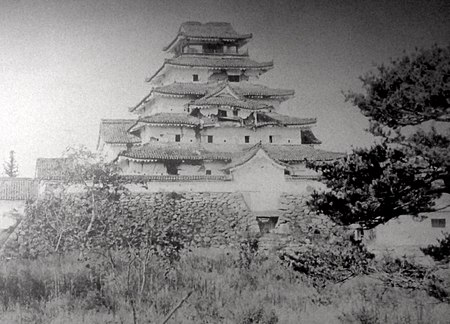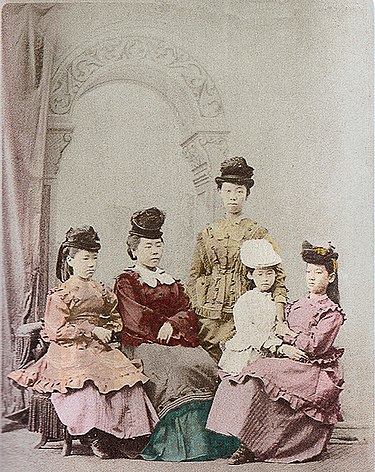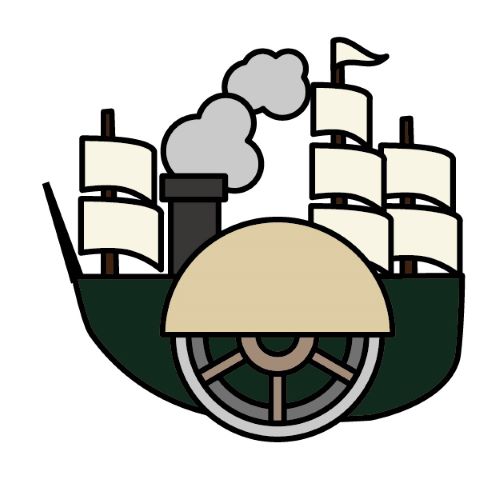(538) The Aizu castle siege [読解]

Aizu castle just after surrender. From Wikipedia.

The History of Modern Japanese Education: Constructing the National School System, 1872-1890
- 作者: Duke, Benjamin
- 出版社/メーカー: Rutgers Univ Pr
- 発売日: 2014/03/14
- メディア: ペーパーバック
The History of Modern Japanese Education / The Modern Education of Japanese Girls
Sutematsu's personal account of the Aizu castle siege.
We women and children were divided into bands1) of workers, those who washed and cooked the rice, those who did the housework, and those who made the ammunition2) for the men at the front. I was too young to be trusted with the making of cartridges3), so the work alloted me was to bring the leaden balls4) from the storehouses, and after they had been made up into cartridges to carry them back to another storehouse, whence5) they were sent to the men..... The last month of the siege, the imperial troops planted guns on the hills around us, and not a day passed when cannon-balls did not whiz6) over our heads, dropping into the castle and crushing into the keep7) itself. It was then part of my work to roll them together in piles, out of the way. My mother, sister, sister-in-law and I expected death at any minute but none of us liked the idea of being mutilated instead of killed outright8). So we made our mother promise that if any of us should be mortally wounded she wounded she would cut off our heads in true samurai fashion. A few days after this, while we were snatching9) a mouthful of food, a shell10) fell into the room, and bursting, wounded my sister-in-law in the breast and me in the neck. My wound was nothing to speak of, and I was up and at work again at the end of the week. It was different with my sister-in-law. We saw that she must die.... Strange as it may seem, my future husband was one of the attacking forces and was swounded during the night assault. Little did I dream that I should be the wife of one of the enemies whose cannon-balls I so carefully rolled into heaps.
Sutematsu's personal account of the Aizu castle siege.
We women and children were divided into bands1) of workers, those who washed and cooked the rice, those who did the housework, and those who made the ammunition2) for the men at the front. I was too young to be trusted with the making of cartridges3), so the work alloted me was to bring the leaden balls4) from the storehouses, and after they had been made up into cartridges to carry them back to another storehouse, whence5) they were sent to the men..... The last month of the siege, the imperial troops planted guns on the hills around us, and not a day passed when cannon-balls did not whiz6) over our heads, dropping into the castle and crushing into the keep7) itself. It was then part of my work to roll them together in piles, out of the way. My mother, sister, sister-in-law and I expected death at any minute but none of us liked the idea of being mutilated instead of killed outright8). So we made our mother promise that if any of us should be mortally wounded she wounded she would cut off our heads in true samurai fashion. A few days after this, while we were snatching9) a mouthful of food, a shell10) fell into the room, and bursting, wounded my sister-in-law in the breast and me in the neck. My wound was nothing to speak of, and I was up and at work again at the end of the week. It was different with my sister-in-law. We saw that she must die.... Strange as it may seem, my future husband was one of the attacking forces and was swounded during the night assault. Little did I dream that I should be the wife of one of the enemies whose cannon-balls I so carefully rolled into heaps.
1) bands: a group of people who do something together or have the same ideas
2) ammunition: objects that can be shot from a weapon, such as bullets or bombs
3) cartridges: a case of containing an explosive charge for blasting
4) leaden balls: balls made of lead
5) whence: from or out of which place, source, or cause
2) ammunition: objects that can be shot from a weapon, such as bullets or bombs
3) cartridges: a case of containing an explosive charge for blasting
4) leaden balls: balls made of lead
5) whence: from or out of which place, source, or cause
6) whiz: to move very quickly, often making a high continuous sound
7) keep: the strongest and securest part of a medieval castle
8) outright: immediately
9) snatch: to take or have something quickly using the only time or chance that you have
10) shell: a projectile for cannon containing an explosive bursting charge
7) keep: the strongest and securest part of a medieval castle
8) outright: immediately
9) snatch: to take or have something quickly using the only time or chance that you have
10) shell: a projectile for cannon containing an explosive bursting charge
私たち女性と子供たちは、ご飯を洗って炊く人、家事をする人、そして前線の男性のために弾薬を作る人の集団にわけられました。私は若すぎて弾薬筒の製造をまかすことができなかったので、私に割り当てられた仕事は、倉庫から鉛の砲弾を持ち帰り、弾薬筒に組み立てられた後、別の倉庫に持ち帰ることでした、そこからそれらは男性へ運ばれました... 包囲の最後の月には、官軍は私たちの周りの丘に大砲を据え付けました、そして大砲の砲弾が私たちの頭上を音を立てて飛び交わない日はなく、城に落ちて天守閣自体を砕かない日は一日もありませんでした。そのとき、邪魔にならないようそれらを転がして積み重ねることが私の仕事の一部でした。私の母、姉、義理の姉、そして私はいつでも死ぬことを覚悟していましたが、私たちのうち誰も即死ではなく、手足を切断され生き絶え絶えの状態になることは受け入れることができませんでした。それで、私たちの誰かが致命傷を負った場合、母親が真の侍のやり方で私たちの頭を切り落とすことを約束してもらいました。この数日後、私たちが一口ほどの食べ物を急いでとっていると、一個の砲弾が部屋に落ちて破裂し、義理の姉は胸を、私は首を負傷しました。私の傷は何ということはなく、私は週末には起きて再び仕事をしていました。義理の姉の傷は違っていました。私たちはわかっていました、彼女は死んでしまうと… 奇妙に思われるかもしれませんが、私の未来の夫は城攻撃部隊の一人であり、夜の襲撃中に負傷しました。敵の大砲の砲弾を注意深く転がして山積みにしていた私が、その敵の一人の妻になるとは夢にも思っていませんでした。
Who is Sutematsu?
At the time of the castle siege11) in 1868, Sutematsu was eight years old. Her personal account12) of the episode, recollected13) as an adult in Japan and composed in English, sgands as tribute14) to her courage as well as the education she received in the United States. It is surely the only recorded account originally in English by a Japanese who was on the scene of a castle siege in feudal Japan.
11) siege: a situation in which an army surrounds a town for a long time so that nobody can get in or out
12) account: somebody's report or description of something that has happened
13) recollect: to remember something especially by making an effort
14) tribute: something that you say or do to show that you respect or admire somebody/something, especially somebody who has died
At the time of the castle siege11) in 1868, Sutematsu was eight years old. Her personal account12) of the episode, recollected13) as an adult in Japan and composed in English, sgands as tribute14) to her courage as well as the education she received in the United States. It is surely the only recorded account originally in English by a Japanese who was on the scene of a castle siege in feudal Japan.
11) siege: a situation in which an army surrounds a town for a long time so that nobody can get in or out
12) account: somebody's report or description of something that has happened
13) recollect: to remember something especially by making an effort
14) tribute: something that you say or do to show that you respect or admire somebody/something, especially somebody who has died
1868年の城包囲の時、捨松(ステマツ)は8歳でした。日本で大人として回想され、英語で書かれた彼女のエピソードの個人的な記録は、彼女の勇気と米国で受けた教育への賛辞となりました。封建時代の日本で包囲された城の現場にいた日本人が最初から英語で記録した唯一の記録であることは間違いありません。

新政府の米国留学女学生 左から、永井しげ(10)、上田てい(16)、吉益りょう(16)、津田うめ(9)、山川捨松(12)。明治4年。姓名はいずれも当時のもの、数字は数え歳 From left, Nagai Shige (10), Ueda Tei (16), Yshimasu Ryo (16), Tsuda Ume (9), Yamakawa Sutematsu (12), in 1871.

新政府の米国留学女学生 左から、永井しげ(10)、上田てい(16)、吉益りょう(16)、津田うめ(9)、山川捨松(12)。明治4年。姓名はいずれも当時のもの、数字は数え歳 From left, Nagai Shige (10), Ueda Tei (16), Yshimasu Ryo (16), Tsuda Ume (9), Yamakawa Sutematsu (12), in 1871.
Why did Sutematsu receive education in the United States?
In 1871 Sutematsu's brother Hiroshi, responsible for the family and the Aizu clan in exile, learned of Kuroda's plan to send young girls abroad for a modern education to promote the development of Hokkaido. Apparently concerned over the future of his sister, Hiroshi submitted an application to the Frontier Bureau on behalf of Sutematsu. With only five applicants, the bureau approved Sutematsu's candidacy along with the other four. The girls departed with the Iwakura Mission on December 21, 1871, on the steamer America amid a colorful ceremony with a fanfare of gun salvos.
 外輪船、Paddle-wheel steamer
外輪船、Paddle-wheel steamer
In 1871 Sutematsu's brother Hiroshi, responsible for the family and the Aizu clan in exile, learned of Kuroda's plan to send young girls abroad for a modern education to promote the development of Hokkaido. Apparently concerned over the future of his sister, Hiroshi submitted an application to the Frontier Bureau on behalf of Sutematsu. With only five applicants, the bureau approved Sutematsu's candidacy along with the other four. The girls departed with the Iwakura Mission on December 21, 1871, on the steamer America amid a colorful ceremony with a fanfare of gun salvos.
 外輪船、Paddle-wheel steamer
外輪船、Paddle-wheel steamer 1871年、家族と、追放された会津藩のために、捨松の兄、浩(ひろし)は、北海道の発展を促進するための近代教育のために若い女子を海外へ派遣するという黒田の計画を知りました。妹の将来をほんとうに心配していた浩は、捨松の代わりに開拓局へ申請書を提出した。申請者は5人だけで、開拓局は他の4人と共に捨松の立候補を承認した。少女たちは1871年12月21日、大砲の一斉射撃のファンファーレを伴う色とりどりの式典の中で、汽船アメリカ丸で岩倉使節団と共に出発しました。
*
*




コメント 0